'Social media doesn't show you trauma of mountain rescue'
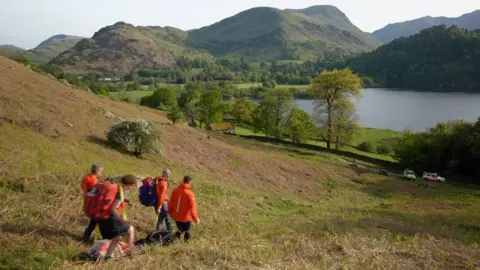 BBC
BBCMountain rescue teams say they could reach breaking point due to a rapid increase in the number of call-outs. Volunteers share their experiences with a hope of making people take safety more seriously.
Social media shows the "nice bits" of walking in the Lake District, Matt Neilson says.
"You don't see the trauma and the bodies that we have to carry off when it goes wrong," he adds.
It's a warm late-spring day and builder Mr Neilson is on the site of his latest property development, a barn conversion just outside of Greystoke in Cumbria.
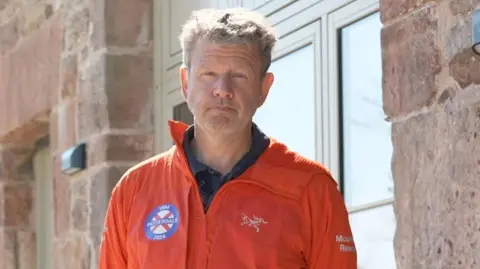
He's his own boss so can decide when he is available to respond to rescues with the other volunteers in the Patterdale team, where he is a deputy leader.
At a moment's notice, he could be on his way to a call-out, leaving behind his workers, wife or teenage sons to carry on whatever he was doing.
"You end up prioritising mountain rescue when you know that there are people on the fell that are stuck and other members of the team who need help," he says.
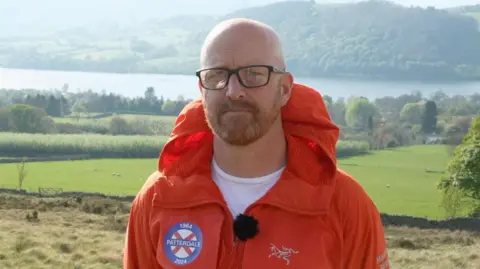
The number of calls Patterdale Mountain Rescue Team receives is growing steadily each year.
In 2023 there were 61 call-outs, in 2024 that had soared to 110, with the team's patch including the hills around Ullswater, Helvellyn and the notorious Striding Edge that has claimed a number of lives.
"This year I would expect, if the numbers continue at the rate that they are, we'll probably be pushing 140, 150," team leader Matt Cox says.
"At some point, as a small team, we're going to start to struggle with that."
Does he think the team might be reaching breaking point?
"Certainly for the teams in the Lake District, I wouldn't say we were quite at breaking point yet, but we're definitely heading in that direction," he says candidly.
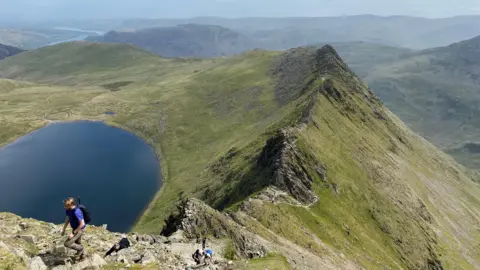 Duncan Leatherdale
Duncan LeatherdaleAnother of the team's volunteers is Dr Dan Jones, a GP specialising in the rehabilitation of older people at Penrith Hospital.
He works with nurses and physiotherapists to help those who have undergone treatment in hospital get well enough to go home.
"I honestly think I have saved more lives in mountain rescue than on a frail and elderly ward," the father-of-three says.
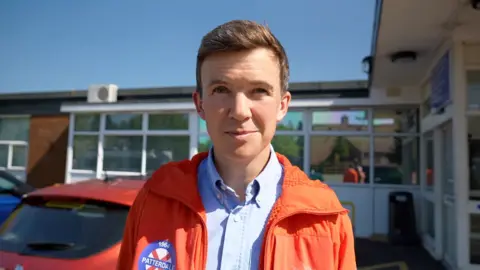
"Because when people get cold and wet and stuck, they really need you. And to think you are helping them like that is a good thing."
A fell runner in his spare time, he enjoys his work with Patterdale Mountain Rescue.
"It's the unpredictability of the call-outs that's sometimes more difficult for me," he says. "Balancing a full time job, a family and mountain rescue is tricky.
"It's a big commitment and it's more than I probably realised when I joined."
Dr Jones says most people who call them out do not realise they are all volunteers.
"We often get comments saying 'oh this must be a nice job' or 'what do you do when you're not on rescues?', and I think they think we're sitting at a base waiting for calls to come in," he says.
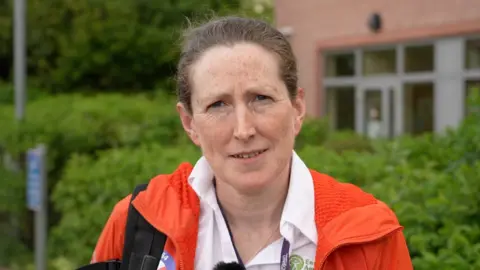
Amy Heys is a manager at the Environment Agency in Penrith and decided to join the Patterdale team during the pandemic so she could "give something back".
She says her managers are very supportive of her role and if there isn't an incident that needs her urgent attention at work, she can use her flexi-time to leave to help with rescues.
Some people think the rescuers are emergency workers like the police or firefighters, she says, but doesn't get frustrated with people who call them out because they usually are in need of help.
"I've been involved in outdoor activities my whole life and I've got myself in bad situations, so I'm very happy to go out to help anybody who's in a bad situation," Ms Heys says.
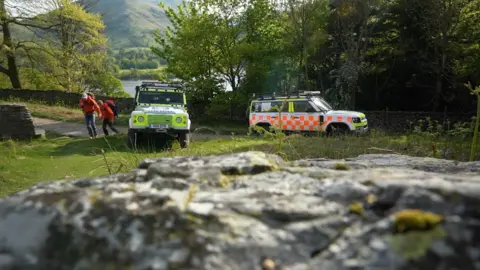
But she says there are a few questions people can ask themselves before they go out on to the fells that could stop them needing to call for help.
"Do you know what the weather's going to be like? Have you got the right skills, have you got the right equipment? You know it's sensible to ask yourself that.
"I think people bite off more than they can chew."
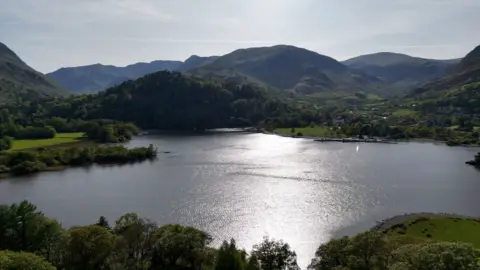
Mr Cox says there is also an unrealistic expectation of what people think the teams can do for them.
"They call us out and people just expect that a helicopter will appear or someone will appear in 20 minutes," he says.
"If you're on the high fells it can take us two hours to get to you, and in those two hours, if you've called us out just because you're not feeling great or its raining and you've got cold, you could have got down yourself.
"Mountain rescue is a free-for-all service that is there 24/7 and we are happy to go out and we are happy to offer advice, but we are just asking people to be a little bit prepared and if stuff does start to look like it's going wrong, sit down, take a breath - can you deal with this situation yourself?
"If you can't that's absolutely fine, give us a call, we'll come out straight away."
